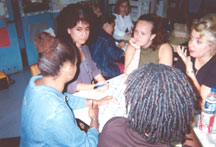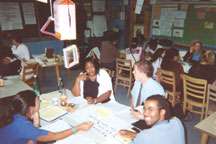As of August 27, the Board Of Education had recruited approximately
7,180 coming close to its target number. Despite their diverse
educational and professional backgrounds, all new teachers certainly
have one thing in common: as the school open their doors to thousands
of students this week, they will be the people standing in the
front of the classroom bearing the responsibility of educating
the students facing them.
Approximately 800 new teachers join the city schools from foreign
countries, bringing with them specialized experience in a variety
of subject areas and arguably, new, diverse perspectives. The
Board of Education interviewed candidates from more than 10 countries
and recruited overseas: 500 teachers from the Caribbean, 125 from
Canada, 60 from Austria, 31 from Italy and 15 from Spain.
International teachers will share their assigned schools with
approximately 1,200 Teaching Fellows. The fellowship, initiated
by the New York City Schools Chancellor Harold Levy one year ago,
seeks to draw young professionals and mid-careers changers with
no previous experience in education to teach in New York City
schools. Those interested in the fellowship submit an application
to the Board of Education. Applicants must have a Bachelor’s degree
and a GPA of 3.0 or higher. Upon acceptance, fellows must pass
two teacher certification exams, including the Liberal Arts and
Sciences Test (LAST) and a Content Specialty Test (CST). Fellows
are required to complete a 200-hour pre-service program prior
to the school year, during which some shadow senior teachers in
summer schools and eventually co-teach. In addition, fellows become
matriculated in a college or university, located in the district
that they will be teaching, where they take courses and work toward
attaining their certification and a Master’s degree in education,
which they must complete in two years. Fellows receive a Provisional
B License until they acquire enough education courses to get their
certification.
Pam Jones, a Teaching Fellow enrolled in the Bankstreet College
of Education, will teach at PS125. She is one of 25 fellows working
with Banks Street this year, all of whom were assigned to four
schools in District 5, in Harlem.

“I
want to give students ownership of their learning. I want them
to come out of the experience feeling as if they want to come
back the next day,” said this new teacher who has an MA in Public
Policy and a BA in Politics, concentrating in Latin American and
Afro-American studies.
Jones, who worked for Project Jump Start (see Education Update,
V.5, July 2001) prior to become a Teaching Fellow, realized that
she wanted to go into teaching upon completing a project for her
previous job that required her to go into the classroom and observe
the teacher-student interaction.
“It
took this last experience for me to realize that I really had
to be teacher,” she said, explaining that several of her previous
jobs included some type of educational component. Jones admitted
to being slightly nervous about embarking on this new career.
“I have the natural jitters,” she said, but explained that her
summer training has given her some preparation.
For Bank Sstreet Fellows, summer training included night courses
focusing on child development, and classroom management. In addition,
they spent their mornings in summer schools were they were assigned
to a classroom to observe the teacher and eventually take over
and teach a few lessons. Fellows were also encouraged to familiarize
themselves with the local community.
“It
[summer training] was wonderful. It provided me with a preview
of what is to come. It provided me with a practical application,”
said Jones. She added that one of the things she learned from
the summer training was the realization: “That I learn just as
much from the students, as they learn from me. Students are teachers.”
Noah Teitelbaum, a fellow who will teach fifth grade at CS133,
who worked in the field of human rights prior to teaching, also
learned something from the summer training program. “Policy papers
and diplomatic meetings were hard, but they never made me quiver.
This is the most challenging job,” he said.
Principals in District 5 look forward to working with the Teaching
Fellows.
“I
know the reputation of Bank Street College and I wanted to have
teachers in my school that I know are trained to do their job,”
said Pamela Craig, principal of CS 133.
Bankstreet fellows will have weekly meetings with Bankstreet staff,
during the year to discuss any concerns facing in the classroom,
in addition to their courses.
“I
am confident that I can become a great teacher after some years,”
said Teitelbaum, a fellow who will teach fifth grade at CS133.
“But, I am confident that now I can care about my students and
dedicate myself. I don’t have great aspirations of saving the
world. I just want to teach a good class.”
Similar aspirations are shared by Gerardo Joven, one of the 116
new teachers that will enter the school system as a corp member
of Teach for America’s class of 2001.
Joven, who graduated in December of 2000 from Kean University
where he majored in history, will teach at PS 28 in District 6.
“I
am going in with a positive mind set. I’m nervous, but also confident,”
said Joven, who has always known that he wanted to become teacher.
As he said, he will bring to the classroom “new ideas, a lot of
energy and the open-mindness to go to veteran teachers and seek
assistance.” Joven has matriculated in the MA in education program
at Pace University.
Corps members have been admitted to one of three education programs—Pace
University, Columbia University Teacher’s College and Bankstreet—where,
like the Teaching Fellows they will work toward attaining an MA
in Education. Approximately three-quarters of these new teachers
are recent college graduates, who have made a commitment to teach
in the New York City school system for two years.
“We
are looking for leaders who have a demonstrated record of achievement
and leadership on their campus,” said Cami Anderson, director
of the Teach for America New York office.

The 2001 corps went through two phases of training. During the
first session, which lasted five weeks, they were divided into
groups of three or four people and placed into a summer school
classroom where they observed a veteran teacher and eventually
taught. In the afternoon, they took courses designed to help them
develop a long-term plan, to identify their goals and expectations,
work with the community and student’s families, and learn how
to achieve their goals. According to Anderson, the curriculum
has been developed after reviewing the teaching techniques of
those teachers that have produced the best results in their classroom.
The second part of the training seeks to introduce the corps to
their particular region they will be working in. Throughout the
two years, the new teachers are assigned to an advisor from Teach
for America, who supports them, while working closely with the
district and the principal. In addition, the corps assigned to
the same school meets in smaller groups once a month to reflect
on their progress concerns. They also engage in policy panels
and retreats throughout the year. According to Anderson, the new
teachers establish a life-long relationship with Teach for America,
regardless of whether they continue to teach after the required
two years.
More than 50% of individuals that enroll in Teach for America
continue to work in the field of education after the two years.
Although not all of them continue to teach, they do remain in
areas related to educational causes.
“They
get in and are so challenged and inspired and learn so much,”
said Anderson, “they become even more committed and realize that
they should stay in the field. They are part of a national movement.”
Amy Christie, originally from Cleveland Ohio and a recent graduate
of Smith College where she majored in sociology, will be teaching
at PS153 in District 6. “I have a lot of enthusiasm and energy,”
she said. “I had some tough times this summer with the kids. You
really have to find it in yourself to go back each day.” She added,
“It’s the small battles that win the war.”

